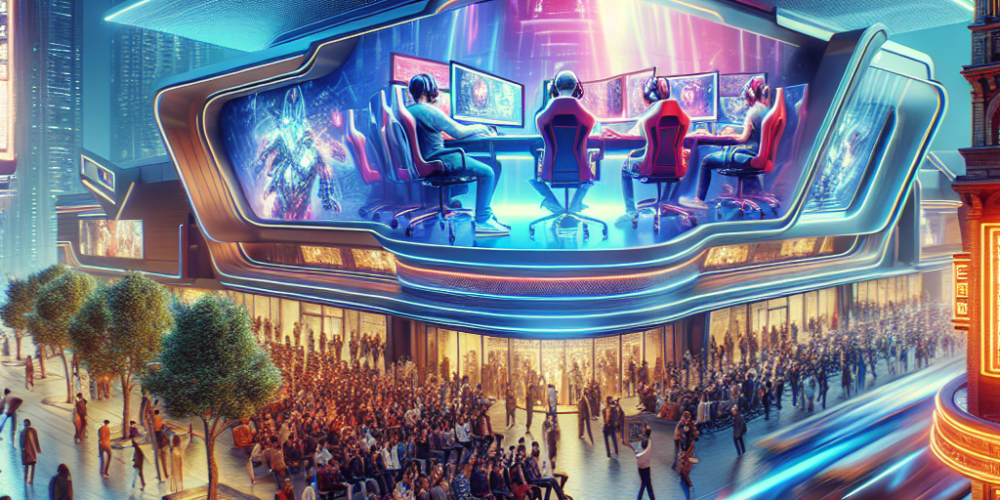In recent years, the explosive growth of eSports has not only reshaped the landscape of competitive gaming but also transformed urban entertainment districts, bringing a new wave of business opportunities and cultural cachet. As major cities around the world vie to become hotspots for eSports tournaments, the implications for local economies and global gaming culture are profound.
eSports, essentially competitive video gaming, has graduated from niche online communities to mainstream entertainment, with millions of followers and gargantuan prize pools. Traditionally, eSports tournaments were relegated to convention centers or temporary setups within sports arenas. However, the increasing spectatorship and financial investment have led to the emergence of dedicated eSports venues that are changing the face of entertainment districts in major cities.
One of the leading examples of this trend is the Esports Stadium Arlington located in Texas, USA. Opened in November 2018, this 100,000 square foot facility is the largest eSports venue in North America. Designed specifically for eSports gaming, it features state-of-the-art production facilities, a major broadcast studio, and seating for up to 2,500 fans. The venue not only hosts local and international gaming competitions but also serves as a cultural hub for gamers and tech enthusiasts.
Cities like Los Angeles, Seoul, and Shanghai have followed suit, each developing their own dedicated eSports arenas. These venues are often strategically placed within entertainment districts to synergize with other cultural and social activities, from cinemas and restaurants to shopping centers and nightlife. This integration helps in capitalizing on the foot traffic and the vibrant atmosphere that eSports events bring, thereby enhancing the overall appeal of the districts.
The economic impact of these developments is substantial. eSports events attract visitors from various regions, boosting local tourism and hospitality industries. Hotels, restaurants, and retail stores all benefit from the influx of gamers and their audiences. Furthermore, these venues create numerous job opportunities, from technical support and event management to marketing and hospitality services.
Moreover, dedicated eSports venues are increasingly seen as a testament to a city’s commitment to technological and cultural innovation. They attract tech-savvy individuals and foster a community around digital entertainment and multimedia experiences. This not only enhances the city’s image as a forward-thinking hub but also attracts investments from major tech and entertainment companies looking to tap into the vibrant eSports market.
The rise of eSports venues also contributes to the urban cultural scene. They become centers for community engagement, offering not just gaming events but also workshops, educational programs, and other community-focused activities. This helps in demystifying eSports, promoting it as a positive and inclusive activity, and integrating gaming into the broader cultural fabric of the city.
The integration of eSports venues into entertainment districts also prompts urban planners and real estate developers to rethink their strategies. The traditional model of entertainment districts as merely places for passive consumption is giving way to more interactive and participatory experiences. The success of eSports venues illustrates the potential for more immersive entertainment forms, which could lead to innovations in other areas such as interactive art spaces, virtual reality experience centers, and more.
Looking ahead, the trend of integrating eSports venues into urban entertainment districts is likely to accelerate. As technologies such as virtual reality and augmented reality continue to evolve, the potential for creating even more immersive and engaging gaming experiences is immense. This could lead to a new era of digital entertainment that blurs the lines between physical and virtual spaces, offering exciting possibilities for gamers and non-gamers alike.
In conclusion, the rise of eSports venues represents a significant shift in the entertainment landscape of cities, reflecting the changing preferences and lifestyles of the digital age. As these venues become cornerstone attractions in entertainment districts, they not only boost local economies but also enrich the cultural tapestry of the cities they inhabit. The future of urban entertainment, it seems, will be significantly influenced by the vibrant and dynamic world of eSports.

David Farbacu is a seasoned writer with a passion for games, gaming, casinos, and Xbox. With a wealth of experience in the industry, David brings insightful reviews, comprehensive guides, and engaging articles that cater to both casual gamers and hardcore enthusiasts. His expertise spans across various gaming platforms and genres, making him a go-to source for the latest trends and developments in the gaming world.

